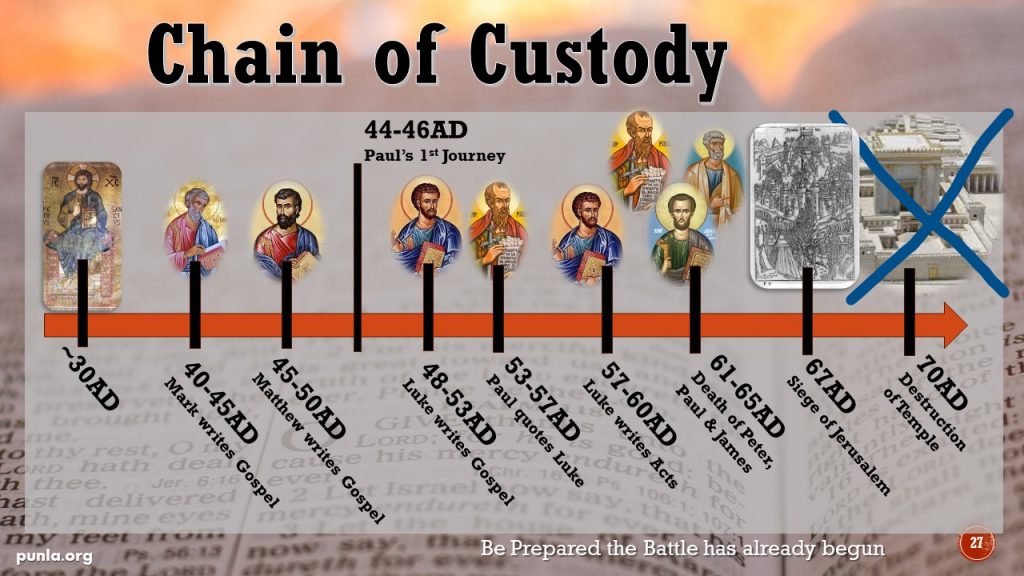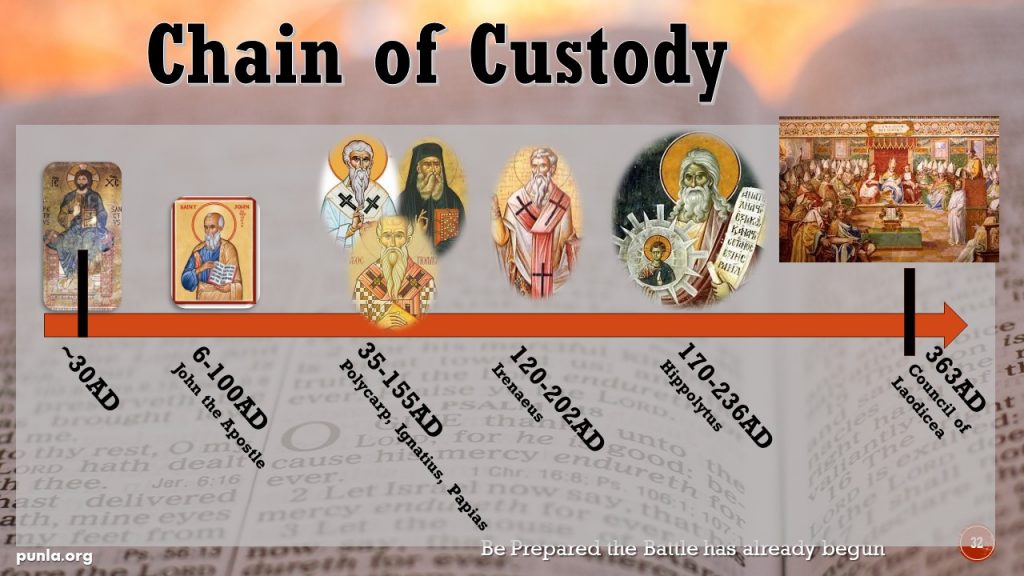Bible Reliability
Chain of custody is another common objection. If you have copies of copies, how can you be so sure these were even written when you claim. Let’s use the Gospel of Mark as our example. Most consider that Mark was most likely the first Gospel account written. We know Jesus’ Death and resurrection was somewhere around AD30 or AD33. None of the New Testament books mention the destruction of the Temple in Jerusalem in AD70 by the Romans. This was one of the most significant event of antiquity, so the fact none of the new testament writers mention it is an obvious clue to the dating of the writings. Remember Jesus predicted the destruction of the Temple, so it would have been an obvious thing to include and corroboration of Jesus prophetic prediction but it’s not there, so the only reasonable explanation is it had not happened when Mark wrote his gospel. Another point in time we know with some certainty was the Missionary journeys of Paul, the first of which was approximately AD44-46. So when would Mark have written his gospel. What else to we know.
We also know Luke did not mention the destruction of the Temple in either the Acts of the Apostles or the gospel according to Luke. And Luke wrote acts after he wrote his gospel, because he says so in Acts. And almost all Bible scholars agree Luke has borrowed text from the Gospel of Mark, meaning Mark must have been written earlier than either of Luke’s books (Gospel of Luke and Acts of the Apostles).
Also, we know that the siege of Jerusalem started around AD67. Again the siege is not mentioned in any of the New Testament books, which means Act, Luke, and Mark had to be written much earlier. But how much earlier?
OIther major historical events not mentioned in the New Testament are the martyr deaths of Paul, Peter, and James the brother of Jesus. Yet history tells us they were all killed around AD61-65. A critic may say, why would the writer mention these deaths. Well, Luke describes the deaths of Stephen and James the brother of John. So there is no reasonable reason to omit these others deaths, unless of course they had not happened yet. The latest reasonable estimate for Luke writing Acts is about AD57-60 at least a year before the deaths of Paul, Peter, and James. But what other evidence do we have that would help us pinpoint the most reasonable date for Mark’s writing.
What about Paul’s letter to Timothy. 1 Timothy 5:18 (NIV), “For Scripture says, Do not muzzle an ox while it is treading out the grain, and The worker deserves his wages.” I sure you are asking why this scripture. Well Paul refers the two phrases as scriptures.
The first one is from Deuteronomy 24:4 (NIV) “Do not muzzle an ox while it is treading out the grain.” But do you know what the second one is?
It is the words of Jesus captured by Luke in his gospel account Luke 10:7 (NIV) “….for the worker deserves his wages”. Paul is references Luke’s gospel as scripture. That means that it must have been written much earlier. Long enough to be considered to be scriptures.
We know with some certainty that Paul wrote to Timothy around AD53-57. So that means Luke’s gospel must be even earlier to be available to Luke. This most likely puts Mark’s gospel earlier than Paul’s missionary journeys.
Additionally, many believe Luke borrowed phrases from Matthew’s gospel as well. And Matthew’s gospel appears to borrow from Mark. You can see that this leads up to conservatively say, Mark’s gospel was probably written no later than AD40-45.
That is only a decade or so after Jesus’ resurrection. A Mark’s gospel could be even earlier maybe within a few years of the events. Mark was young but educated. He would have been around the Apostles and may have been asked to scribe their early accounts. We don’t know but we have excellent evidence to believe Mark was written very early.

So much for the myth & legend objection. These accounts are very close to the actual events. Early enough to have many eyewitnesses around you could challenge anything that was not consistent with the actual events.
Another objection you hear sometimes is the conspiracy theory. Just to put a stop to this. There is absolutely no way to construct a conspiracy that survives with so many witnesses. Any time you have more than two, a conspiracy always fail. Plus, few would be willing to die for the lie. None of the Apostles recanted, they were all willing to die for the gospel. It is beyond statistically impossible for so many to die for a conspiracy they would have know to be false. People do die for lies but the people that die inevitably believe the lie, if they know it’s a lie, they typically would recant.
So what about the other objections? All those mistakes and scribal changes. As Dr. Wallace explained none of those issues with the manuscripts affects any core tenant of Christianity. Do we know for sure what the original said word for word. We don’t know. But is the message of the scripture consistent with the originals. Well yes. Based on the evidence and the types of variations, it appears no content has been modified or altered in any meaningful way. The idea of myths and legends growing over time is simply not consistent with the timing of when these documents had to have been written. No serious scholar would doubt when these were written. But what about the changes over time. How do we know early church fathers had a consistent understanding?
Well chain of custody from Apostle like John, Peter and Paul until the early church councils like the one in Laodicea
If you read the book Cold Case Christianity, J. Warner Wallace outlines the wealth of evidence we have from the early church fathers until the early church councils.
Here is just one example using the Apostle John. Who we believe lived between 6-100AD. During this time of course he witnessed the life of Jesus, wrote his gospel and letters.
We also know that John taught several early church leaders including Polycarp, Ignatius, and Papias.
Ignatius lived from about 35-117AD and was known to be a student of John. Ignatius later became the Bishop of Antioch presumably following Apostle Peter. He wrote several letters that survive to today. These letters quote from Matthew, John and Luke as well as several of Paul’s letters.
Papias lived from about 60-135AD and is described as a “hearer of John”. Papias became the Bishop of Hierapolis. Papias wrote letters and a five volume treatise called the Interpretations of the sayings of the Lord.
Polycarp lived from 69-155AD and was a known companion of Papias and friend of Ignatius as well as a student of John. Polycarp became the Bishop of Smyrna. He wrote lots of letters which reference at least 14 maybe as many 16 New Testament books.
Ignatius, Papias, and Polycarp taught Irenaeus. Irenaeus lived from about 120-202AD. He was from Smyrna and evidentially became the Bishop of Lugdanum in Gaul which is modern day Lyons, France. His extensive letters reference at least 24 books of the New Testament as Scripture.
Irenaeus taught Hippolytus. Hippolytus lived from about 170-236AD. He was born in Rome. He wrote and spoke extensively referencing at least 24 books of the New Testament and influencing such early Church Fathers as Origen of Alexandria. He was eventually exiled and martyred by Emperor Maximus Thrax.

Wallace takes the time to show this for Paul and Peter as well in his book, These early fathers wrote so much about the gospels and the writings of Paul, John, and Peter, that you could recreate them from the early church fathers’ letters, even if no manuscripts of the new testament survived. So, I encourage you to read his book if this interests you. I won’t spend anymore time on it here because of time. We do not find contrasting versions, differing opinions of interpretations of course, but the actual quoted scripture aligns in all meaningful ways with the scripture we have in our hands today.
So really none of these objections stand up to the evidence we have. That may not convince them but they will have a lot of trouble refuting the wealth of evidence that is available.
This is the end of How to Defend your Faith Session 7: Can U Trust the Bible (Part 3 of 4)


